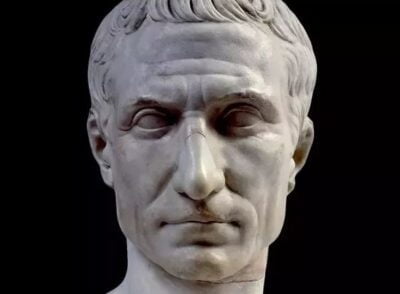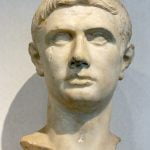Gaius Julius Caesar (100 – 44 BCE) was a politician, general, dictator and writer. One of the members of the Populares, related to Cinna and Marius. After their death, he held successively the offices of quaestor, aedile, praetor, consul and dictator. He gained fame thanks to his exile in Gaul and thanks to the help of his soldiers he managed to overcome the opposition, focused on the Senate and Pompey, and then, after many years of fighting, take over the full power in Rome. Murdered during the Ides of March by senators led by Marcus Brutus and Gaius Cassius. Before his death, he adopted Gaius Octavian, designating him as his heir.
- “It is not the custom of the Roman people to discuss terms with an enemy under arms”
- latin: [Non esse consuetudinem populi Romani accipere ab hoste armato condicionem: ]
- source: Gaius Julius Caesar,Commentarii de bello Gallico, 5.41
- “As a general rule, it is unseen terrors which have the most powerful effect on men’s minds”
- latin: [Omnia enim plerumque quae absunt vehementius hominum mentes perturbant]
- source: Gaius Julius Caesar, Commentarii de bello Gallico, VII.84
- “Do you not think it is matter for sorrow that while Alexander, at my age, was already king of so many peoples, I have as yet achieved no brilliant success?”
- description: written in Greek.
- source: Plutarch, Caesar, 11
- “Gaul is a whole divided into three parts”
- latin: [Gallia est omnis divisa in partes tres]
- source: Gaius Julius Caesar, Commentarii de bello Gallico
- “Even you, Brutus?”
- description: those words are Shakespeare’s invention. In fact, he was supposed to say, “You too, child?”
- latin: [Et tu, Brute?]
- source: William Shakespeare, Julius Caesar, III, 1
- “The die has been cast”
- latin: [Alea iacta est]
- description: Menander’s poem allegedly repeated by Caesar when crossing the Rubicon. Caesar was to say these words in Greek.
- source: Suetonius, Julius Caesar, 32
- “Robberies which are committed beyond the boundaries of each state bear no infamy, and they avow that these are committed for the purpose of disciplining their youth and of preventing sloth”
- latin: [Latrocinia nullam habent infamiam, quae extra fines cuiusque civitatis fiunt, atque ea iuventutis exercendae ac desidiae minuendae causa fieri praedicant]
- description: about Germans, emphasizing their bad nature.
- source: Julius Caesar, Commentarii de Bello Gallico, VI.23
- “I have you, Africa”
- latin: [Teneo te, Africa]
- description: Caesar’s words as he rolled over in front of his soldiers as he stepped off the ship off the coast of Africa.
- source: Suetonius, Life of Julius Caesar, 59
- “My wife should be as much free from suspicion of a crime as she is from a crime itself”
- latin: [Quoniam meos tam suspicione quam crimine iudico carere oportere]
- description: in this way, Julius Caesar justified the dismissal of his wife, Pompeia. Caesar believed that she was compromised by Publius Clodius, who in disguise got to her house on the day of the Good Goddess, reserved only for women. Used also in form: “Because my family should not only be free from guilt, but even from the suspicion of it”.
- source: Suetonius, Life of Julius Caesar, 74
- “I am not much in fear of these fat, long-haired fellows, but rather of those pale, thin ones”
- description: about Cassius and Brutus plotting against him. Written in Greek.
- source: Plutarch, Caesar, 62
- “From a common infirmity of human nature, that we are more flushed with confidence, or more vehemently alarmed at things unseen, concealed, and unknown, as was the case then”
- latin: [Communi fit vitio naturae, ut invistatis atque incognitis magis confidamus vehementiusque exterreamur]
- source: Gaius Julius Caesar, Commentarii belli civilis II, 2.4
- “I came; I saw; I conquered”
- latin: [Veni, vidi, vici!]
- description: during his triumph over Pontus, he had an inscription bearing these words carried before him. In this way, Caesar referred to his rapid victory over the king of Pontus Farnaces at Zela.
- source: Suetonius, Caesar 37
- “In the end, it is impossible not to become what others believe you are”
- description: no reliable source.
- “What we wish, we readily believe, and what we ourselves think, we imagine others think also”
- latin: [Quae volumus, ea credimus libenter, at quae sentimus ipsi, reliquos sentire speramus]
- source: Gaius Julius Caesar, Commentarii belli civilis II, 27.2
- “You carry Caesar and Caesar’s fortune”
- latin: [Caesarem vehis, Caesarisque fortunam]
- description: words to captain of the boat.
- source: Plutarch, Caesar 38, 3
- “I would rather be the first man here than the second man in Rome”
- description: about a small Alpine town. Written in Greek.
- source: Plutarch, Caesar, 11
- “I love treason but hate a traitor”
- description: written in Greek.
- source: Plutarch, Romulus, 17







